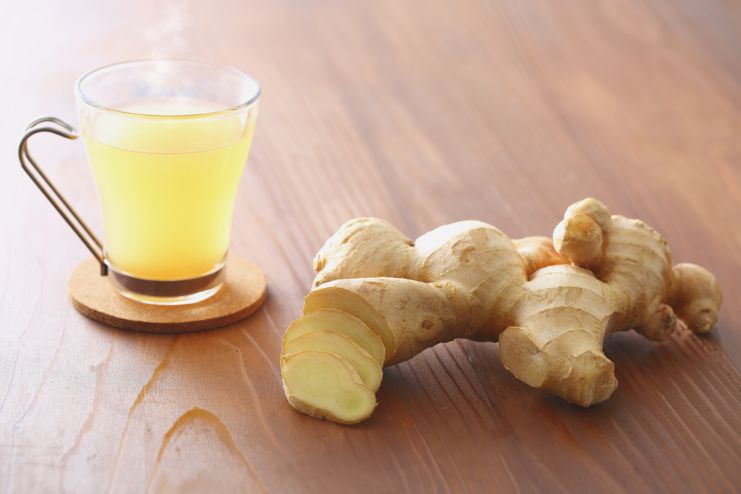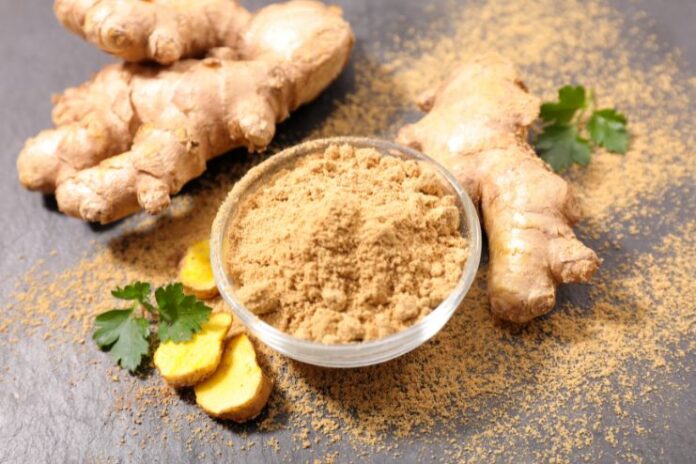Ginger has been utilized in numerous cultures for centuries in traditional medicine due to its potent therapeutic effects. In Ayurveda, Chinese, and herbal medicine, ginger has historically been a favored treatment for stomach issues such as indigestion, nausea, bloating, and cramping. Ancient manuscripts referred to it as “the universal medicine” because of its warm and fragrant properties, which assist in calming an upset stomach.
Ginger is a tonic for the digestive system that warms the stomach. It also has analgesic, antimicrobial, and anti-inflammatory properties that help alleviate stomach problems. Overall, its antioxidant qualities support stomach health.
However, how can you incorporate ginger into your regimen for immediate gastrointestinal relief? Let’s explore the best ways to use ginger for stomach issues.
Read More: Ginger Tea For Weight Loss – Does It Work?
Why Ginger Works for Stomach Problems?
Ginger is a time-tested natural remedy for various stomach disorders, besides being a delicious spice.
The main active constituent of fresh ginger, gingerol, possesses extremely potent anti-inflammatory and antioxidant activities. It is credited with stimulating the motility of the gastrointestinal tract, enabling the food to pass on from the stomach to the subsequent stage of digestion.
When the ginger is dried, it forms shogaol, which is much more effective in calming nausea and bloating. Ginger is a good herbal medicine for indigestion and gastrointestinal health.
Ginger Tea
Ginger tea tastes great after supper and is especially good in winter. Add some honey and a little lemon or lime to create a delicious drink.
Many supermarkets occasionally sell commercial ginger tea bags containing dry ginger and additional ingredients. These tea bags are easy to brew and store conveniently. While tea prepared with dried ginger may taste milder, fresh ginger has powerful health advantages on par with those of dried ginger.
Making ginger root tea with fresh ginger requires a bit more work, but the result is usually a stronger, livelier beverage.
In addition to being a spice, you can buy ginger fresh or use it as an ingredient in teas, ginger ale, and candies.
Read More: 18 Uncomparable Health Benefits of Ginger Tea
How to Use Ginger for Different Stomach Problems

Ginger is a multipurpose natural cure for a number of stomach problems, including nausea, stomach flu, and indigestion. The finest use of ginger for particular digestive issues is listed below:
Ginger for Bloating and Indigestion:
When food stays in the stomach for too long, it can cause bloating, discomfort, and a buildup of gas. Ginger aids digestion by stimulating the production of digestive enzymes, which help speed up the process of stomach emptying and relieve bloating.
It also contains natural compounds that help alleviate gas and soothe digestive discomfort. Similar to peppermint, ginger relaxes the muscles in the digestive tract, allowing food to move more smoothly through the system.
Ginger for Nausea and Vomiting:
Since ginger is well known for its ability to prevent nausea, it can be used to treat post-surgery nausea, motion sickness, and morning sickness during pregnancy. Women have appreciated ginger’s ability to alleviate “morning sickness” and other pregnancy-related nausea for decades.
Research suggests that 1,500 mg of ginger may help avoid vomiting and alleviate nausea. A simple and safe approach to increasing your intake of ginger is to add ginger root to a cup or two of tea.
Ginger for Acid Reflux:
Ginger prevents acid reflux and heartburn by calming the stomach lining and lowering acid production. Phenolic compounds are among the several substances and antioxidants found in ginger. These could have positive health effects, like lowering acid reflux-related inflammation.
Additionally, the anti-inflammatory qualities of ginger may aid in lowering stomach acid production. It could lessen mild acid reflux symptoms. Ginger may also help reduce esophageal inflammation and gastrointestinal irritation in small doses.
Ginger for Stomach Flu:
Ginger is frequently used to treat nausea, one of the main symptoms of stomach flu. Although there isn’t much data on ginger specifically for stomach flu nausea, studies have shown that it helps with motion sickness, pregnancy nausea, and nausea from cancer treatments.
People with the stomach flu can take ginger by drinking ginger ale, chewing a piece of ginger, or swallowing ginger capsules.
Read More: 10 Health Benefits of Ginger That You Wouldn’t Have Imagined
Other Health Benefits of Ginger

Can aid in Osteoarthritis: Joint degradation characterizes osteoarthritis (OA), causing pain and stiffness in affected joints. Ginger may lessen pain and impairment, according to one review.
Lessen Menstruation Pain: Ginger may help ease dysmenorrhea, another name for menstrual pain. Studies show ginger can relieve menstrual pain, as well as acetaminophen, caffeine, and ibuprofen (Novafen).
May Lower the Risk of Cancer: Due to gingerol and other anti-inflammatory and antioxidant components, ginger may have anticancer effects. According to research, ginger may help lower the risk of gastrointestinal malignancies, including colorectal, pancreatic, and liver cancer.
Twenty participants with a high risk of colon cancer ingested two grams of ginger every day for 28 days as part of one trial. At the end of the research, the participants’ intestinal lining showed fewer cancer-like alterations than anticipated.
Read More: DIY Herbal Teas: 7 Home Remedies to Soothe Common Ailments
Who Should Avoid Ginger?
Ginger is a potent natural cure for digestive health, but not everyone can benefit from it. Some people should limit or avoid it to minimize any difficulties.
- Gallstone sufferers may have worsening gallbladder problems as a result of ginger’s stimulation of bile production. Its potent nature may also aggravate stomach ulcers, causing pain or a rise in acid production.
- High dosages of ginger may be dangerous for a pregnant woman, especially in the later stages of pregnancy, even if it can aid with morning sickness.
- For those with bleeding disorders, ginger may increase the risk of bleeding since it slows blood coagulation. People with a history of bleeding disorders or those on blood thinners should exercise caution.
- Due to its blood-thinning qualities, ginger should typically be avoided at least two weeks before any planned operation to minimize excessive bleeding.
- People with naturally low blood pressure or those currently using blood pressure medication may experience problems since ginger lowers blood pressure.
- Even though ginger can be good for heart health, people with specific cardiac issues should speak with their doctor before using it.
Which Drugs Shouldn’t you combine with Ginger?

If you are using any of the following medications, you should exercise caution as ginger may interact with them:
Blood Thinners (Anticoagulants and Antiplatelets): Warfarin (Coumadin), clopidogrel (Plavix), and aspirin are examples of blood-thinning drugs that ginger might intensify, raising the risk of bleeding.
Diabetes drugs: Ginger can drop blood sugar levels, which may cause hypoglycemia and intensify the effects of diabetes drugs. If you take insulin, metformin, or sulfonylureas, you should closely monitor your blood sugar levels.
Immune Suppressants: Ginger’s immune-boosting qualities may help offset the effects of medications that weaken the immune system, like those taken after organ transplantation.
Antacids, H2 Blockers, and Proton-Pump Inhibitors: Ginger may alter the stomach’s acidity, which may interfere with heartburn and GERD drugs, including ranitidine (Zantac), omeprazole (Prilosec), and antacids.
Cardiac Glycosides: Digoxin and other heart drugs may interact with ginger, altering heart rhythms.
Read More: Sirtfoods: Can These Special Foods Turn on Your “Youth Genes”?
Conclusion
Indigestion, bloating, nausea, acid reflux, and stomach cramps are just a few of the stomach issues for which ginger is an effective natural treatment. Its medicinal ingredients, such as shogaol and gingerol, aid in calming the stomach lining, promoting digestion, and lowering inflammation. This adaptable item can offer rapid and efficient treatment whether you consume it as tea, chew raw ginger, take supplements, or incorporate it into meals.
Since every person’s body responds differently, it’s wise to try various techniques to determine which ones work best for you. If you frequently experience stomach aches, try adding ginger to your regular routine to see the results for yourself.
Have you ever used ginger to treat stomach issues? Leave a comment below with your experience.
References
- https://www.healthline.com/health/ginger-for-treatment
- https://www.hopkinsmedicine.org/health/wellness-and-prevention/ginger-benefits
- https://pmc.ncbi.nlm.nih.gov/articles/PMC6341159/
- https://www.goodrx.com/well-being/gut-health/foods-that-help-reduce-bloating
- https://www.healthline.com/health/digestive-health/ginger-for-acid-reflux#benefits
- https://www.healthline.com/nutrition/what-to-eat-when-you-have-the-stomach-flu#ginger
- https://www.healthline.com/nutrition/11-proven-benefits-of-ginger#11-health-benefits
- https://www.health.harvard.edu/staying-healthy/health-benefits-of-ginger-and-simple-ways-to-incorporate-this-zesty-root-into-your-diet
- https://www.mountsinai.org/health-library/herb/ginger
- https://peptiko.gr/en/who-should-avoid-ginger-interactions-with-medications
- https://www.medicalnewstoday.com/articles/310481#prevention
In this Article




















